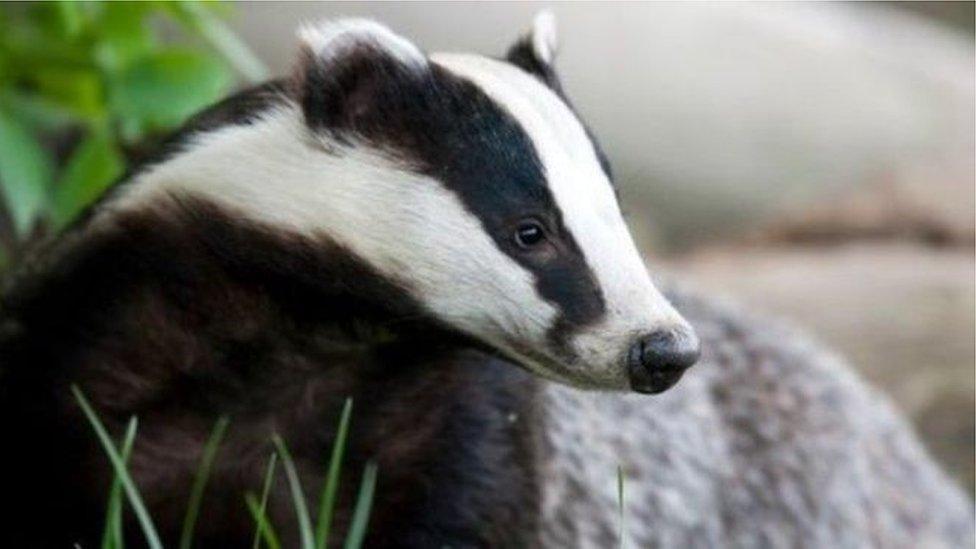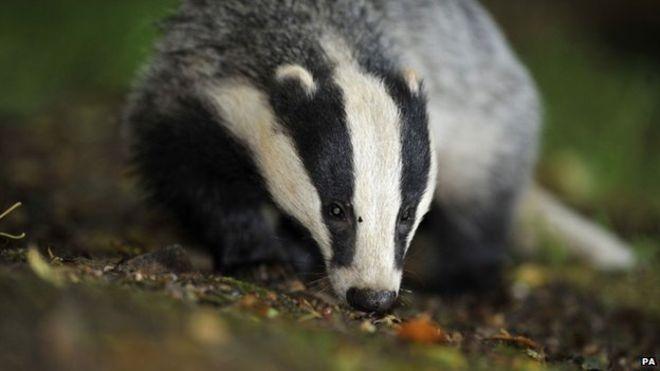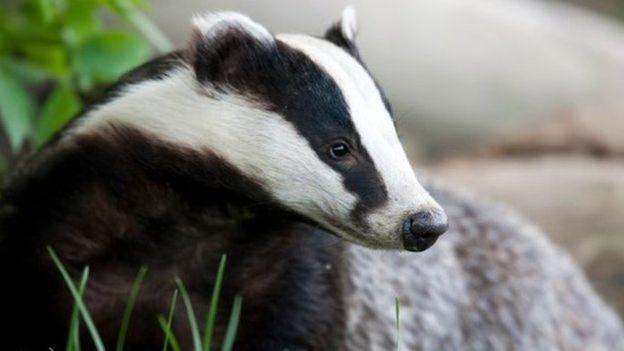Badger culls extended to Wales to stem spread of cattle TB
- Published

Badger culling is to be extended to parts of Wales to control the spread of TB in cattle.
It will be used at a farm-scale level if infected badgers are found on a site.
This is despite scientific evidence that culling at a local level increases TB infection in cattle.
Details of the plan were given by the country's Chief Vet, Prof Christianne Glossop, at a symposium on cattle TB, external in London.
Prof Glossop told BBC News that she could not be certain that culling badgers at a farm-scale level would not increase TB infection but said she wanted to try out culling in situations where all other measures had failed.
"I agree that there is a risk, but some of these farms have been under TB restrictions for over 10 years. We have removed cattle after cattle, increased biosecurity - but the farmer still has TB infection," she explained.
The Welsh government stressed that the culls would not be like those in England where culling companies shoot both infected and non infected badgers. Instead, only infected badgers would be killed humanely.
Read also: 'Fake science used to back badger culls'
'Counter productive'
An extensive assessment of badger culling carried out in the 1990s showed that culling badgers on a small area such as a farm increased infection.
The researchers at the time speculated that this was because the culling increased the movement of badgers. It is for this reason that culls in England are conducted over very large areas greater than 150 square kilometres, where researchers believe the proportion of infected badgers moving is small relative to the area culled.
Prof Rosie Woodroffe, who was among those who carried out the so-called Randomised Badger Control Trial (RBCT), criticised the Welsh plan.
"The Welsh government has made great strides in reducing cattle TB through improved cattle testing. It seems a great shame to risk undoing all that progress by farm-scale badger culling, which all the evidence shows is likely to increase cattle TB rather than reducing it.
"The Welsh plan is to kill only badgers that test positive for TB - but that approach was tried in the 1990s. Then, testing was shown to miss a high proportion of the infected badgers, leaving them to spread the disease. And, more recent research suggests that killing even a small number of badgers is enough to disrupt social behaviour, potentially spreading TB over a wider area."
'Flawed approach'
Prof Glossop said that Prof Woodroffe's 1990s trail might be flawed because it was interrupted by the foot-and-mouth epidemic. And she added that the proposed Welsh culls would be carried using a "completely different approach".
Under her scheme, farms where TB infections have been endemic will be assessed to see if there are infected badgers on the site. If there are, badgers on the farm will be culled each year until the infection disappears.
The farm will be monitored and if TB infection in cattle increases, culling will stop.
"We all find ourselves turning to the RBCT for our evidence base because it was the largest and most extensive study that anyone has ever done. But although it was a very well designed and carefully supervised study, you have to face the fact that some elements of the trial on the ground did not quite meet the objectives of the study.
"And although it is said that there was an increase in infection because of an increased movement of badgers, nobody has proved that."
Farmers' heartache
The farms where TB infections are high are in the South West and on the border with England. If infected badgers are found on these farms, culling could begin this year.
The Welsh government has been very successful in reducing TB in cattle though a rigorous cattle-testing programme. Infected animals have been removed and slaughtered since 2009.
It has also had a programme of badger vaccination in parts of Pembrokeshire. In that time incidence of TB in cattle has been reduced by 48%.
There are currently just under 12,000 herd of cattle in Wales. More than 95% of them are TB free.
Of the 500 herds that have TB, it is persistent in 50 or 60 of these herds where traditional approaches have been infective - and it is in these areas that farm-scale badger culling will be tried out.
"These (TB infections) are causing a lot of heartache," said Prof Glossop. "They are costing a lot of money and are a reservoir of infection in itself."
Follow Pallab on Twitter., external
- Published28 March 2017

- Published16 December 2016
